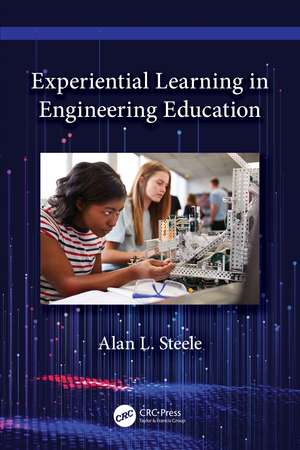Experiential Learning in Engineering Education
Autor Alan L. Steeleen Limba Engleză Paperback – 8 oct 2024
Features
- Focuses on recent and practical aspects of implementing experiential learning to help improve engineering education
- Offers an examination of the undergraduate experience, which leads to professional certification
- Includes a chapter on lessons in other professional education areas, such as medicine and health care, business and social work
| Toate formatele și edițiile | Preț | Express |
|---|---|---|
| Paperback (1) | 438.86 lei 6-8 săpt. | |
| CRC Press – 8 oct 2024 | 438.86 lei 6-8 săpt. | |
| Hardback (1) | 841.18 lei 6-8 săpt. | |
| CRC Press – 28 apr 2023 | 841.18 lei 6-8 săpt. |
Preț: 438.86 lei
Nou
Puncte Express: 658
Preț estimativ în valută:
83.98€ • 87.11$ • 70.03£
83.98€ • 87.11$ • 70.03£
Carte tipărită la comandă
Livrare economică 28 martie-11 aprilie
Preluare comenzi: 021 569.72.76
Specificații
ISBN-13: 9781032466910
ISBN-10: 103246691X
Pagini: 280
Ilustrații: 38
Dimensiuni: 156 x 234 mm
Greutate: 0.52 kg
Ediția:1
Editura: CRC Press
Colecția CRC Press
Locul publicării:Boca Raton, United States
ISBN-10: 103246691X
Pagini: 280
Ilustrații: 38
Dimensiuni: 156 x 234 mm
Greutate: 0.52 kg
Ediția:1
Editura: CRC Press
Colecția CRC Press
Locul publicării:Boca Raton, United States
Public țintă
Academic, Adult education, and GeneralCuprins
1. Introduction. 2. Education Theory and Experiential Learning. 3. Laboratories. 4. In-class Experiential Learning. 5. Problem Based Learning, CDIO and Project Based Learning. 6. Projects. 7. Cooperative Education. 8. Beyond the Curriculum: Undergraduate Research and Student Societies. 9. Lessons from Other Professional Programs. 10. Engineering and Society. 11. Final Pieces and Conclusion.
Notă biografică
Alan L Steele is the Director for the Discovery Centre for Undergraduate Research and Engagement at Carleton University. He earned his PhD in Physics at the University of Salford in 1993. He is also a founding member of the Canadian Engineering Education Association. His research is centered around general engineering education, learning spaces, nonlinear optical fibre, optical switching, and microcontroller systems for biomedical and unmanned airborne system.
Recenzii
“Steele’s excellent examination of pedagogical theories and learning approaches provides the grounding to help understand the ‘how’ of learning and teaching modes of experiential learning and the ‘why’ of its importance in supporting student development of critical and creative thinking, and the capacity for life-long learning. The inclusion of diverse examples, applications and case studies allows us as readers to re-imagine our own classroom practice, and to help students make connections between different forms of knowledge.” - Dorothy Missingham, The University of Adelaide
“Alan Steele provides a thorough treatment of experiential learning in engineering education, covering all the key concepts and approaches, while also offering lots of references in support of them. Combining everything in one text makes for an invaluable resource for any engineering educator, and it’s all the better that Steele incorporates ideas and case studies from around the globe.” - Sean Maw, University of Saskatchewan
“Alan Steele provides a thorough treatment of experiential learning in engineering education, covering all the key concepts and approaches, while also offering lots of references in support of them. Combining everything in one text makes for an invaluable resource for any engineering educator, and it’s all the better that Steele incorporates ideas and case studies from around the globe.” - Sean Maw, University of Saskatchewan
Descriere
Experiential learning is an evolving form of education that involves "learning by doing" and having the students reflect on the work. The book discusses recent developments in the use of experiential learning for engineering education. It covers a range of teaching innovations and includes case studies from institutions around the world.
